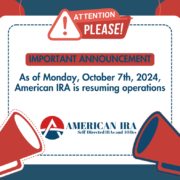Rolling Over A Former Employer’s 401k? Consider A Self-directed Solo 401k
Have a 401k from a former employer you need to either cash out or move to another plan soon? Consider your options carefully. The knee-jerk recommendation from many advisors is to roll over a 401k into an IRA or Roth IRA because of the access to a much wider array of mutual funds, stocks, bonds or other securities. But in some circumstances, this isn’t the best advice – especially for investors interested in Self-Directed Solo 401k strategies.
For example here are some questions to consider when thinking about a Self-Directed Solo 401k,
Will you want to begin withdrawing the money early? If you’ve left the work force, the 401k allows you to begin withdrawing your money earlier than the IRA – without the need to pay a 10 percent excise tax for early withdrawals. IRAs impose the 10 percent penalty on withdrawals before you turn age 59½. A 401k allows you, in certain circumstances, to begin taking money out penalty free beginning at age 55.
Asset Protection Issues
IRAs enjoy substantial creditor protection, especially if the IRA is not an inherited asset but was funded using the owner’s own earnings, or the earnings of a spouse, via a spousal IRA. But the IRS can still levy an IRA account, including, potentially, self-directed IRAs, in order to satisfy a tax debt.
But 401k plans are different. Assets in a 401k are not held in your name personally, but in a trust on your behalf. This means that they cannot be seized in the event of a bankruptcy or judgment against you. Even the IRA cannot directly levy a 401k account because of a personal debt. The best the IRS – or any other creditor – can do with assets in a 401k is obtain a charging order – authorizing them to intercept income from the 401k when you take money out of the account, similar to a wage garnishment. But you can control when you take a distribution.
Few creditors want to wait years or decades for their money, and fewer still plaintiff lawyers want to wait that long to get paid. This is enough to dissuade many creditors or plaintiff’s attorneys, or to convince them to settle a case early on a basis favorable to you.
Tax Benefits of Real Estate 401k’s
If you are self-employed, or the owner-employee of your own company, and you are interested in owning real estate, it may make sense to roll your old 401k assets into a new Self-Directed Solo 401k you establish for your business. The Self-Directed Solo-401k may be an excellent match for businesses with just one full-time employer, or businesses owned and operated by married couples: In addition to the asset protection benefits, 401k’s are not generally subject to unrelated business income tax. This means your Self-Directed Solo 401k plan can borrow money to invest in real estate (on a non-recourse basis) without generating a tax liability on capital gains or income received from the 401k.
Real estate held in a Self-Directed Solo 401k is considered ‘passive income’ by the IRS, and therefore exempt from UBIT.
Otherwise, if you simply rolled your old 401k into an IRA and tried to pursue leveraged real estate strategies, you could be forced to pay income tax and capital gains tax on any amounts attributable to the leverage, rather than on your own money.
If you are interested in real estate ownership within your 401k, IRA or any other retirement vehicle, or you simply want to go over your options for rolling over a 401k from a prior employer, call American IRA, LLC today at 866-7500-IRA(472).
Alternatively, you can visit our website at www.americanira.com, and download hundreds of timely, informative articles, guides, blog posts and e-books about the advantages of self-directed investing.
We look forward to hearing from you.







